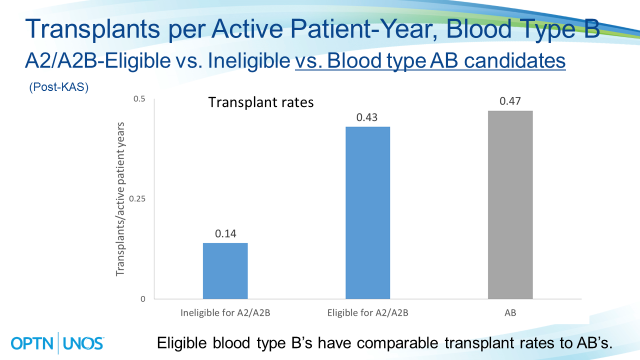Through the kidney allocation system (KAS) implemented in 2014, kidney transplant programs nationwide can list eligible candidates with blood type B to receive deceased donor kidneys with compatible subtypes of either A or AB blood types (known either as non-A1/non-A1B or A2/A2B). Prior to KAS, this form of matching had been done on a voluntary basis through a policy variance.
A 2016 study* showed that since KAS implementation, candidates listed as eligible for non-A1/non-A1B to B transplantation have been transplanted at a rate three times the rate of type B candidates not listed as eligible for such offers and comparable to the transplant rate of blood type AB candidates.
However, the number of these transplants is still small, and relatively few transplant candidates are reported as eligible compared to the number estimated to qualify.
The great majority of transplant programs have not performed any transplants from non-A1/non-A1B donors. Common challenges identified by programs include establishing titer thresholds, developing an institutional informed consent policy and determining patient eligibility.
The OPTN/UNOS Minority Affairs Committee is currently seeking public comment on guidance to help transplant programs establish protocols for performing this form of transplantation. Please review the proposal to learn more and offer feedback.
*The study was presented at last year’s American Transplant Congress:
Stewart, Darren; Cherikh, Wida; Kucheryavaya, Anna; Bryan, Christopher; Turgeon, Nicole; Aeder, Mark; “Subtype-Compatible (A2/A2B-B) Transplantation under KAS Increases Access 3-Fold for Blood Type B Patients, yet Very Few Candidates are Listed as Eligible,” American Transplant Congress, Boston, 2016.

